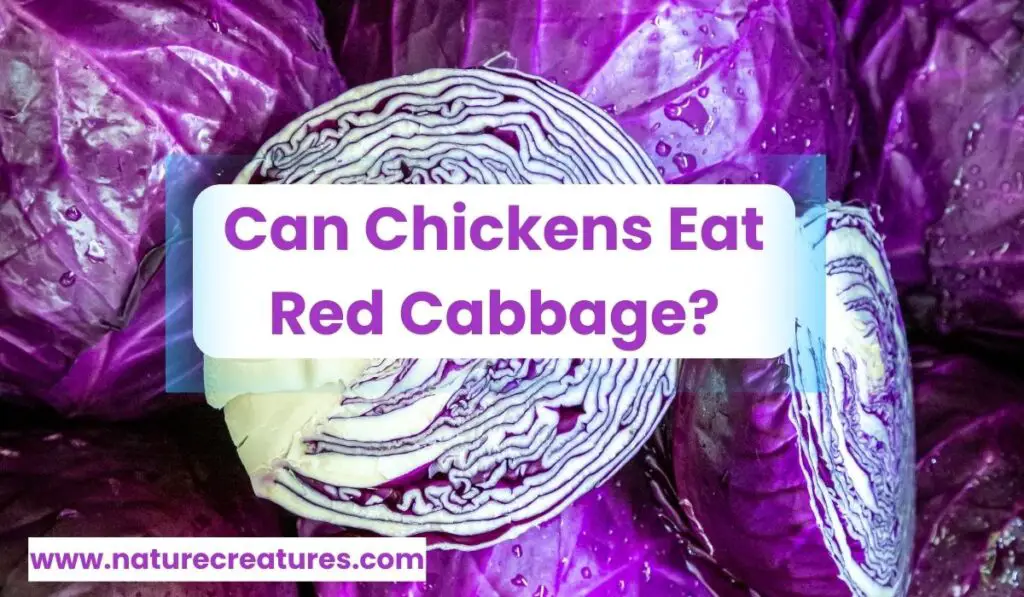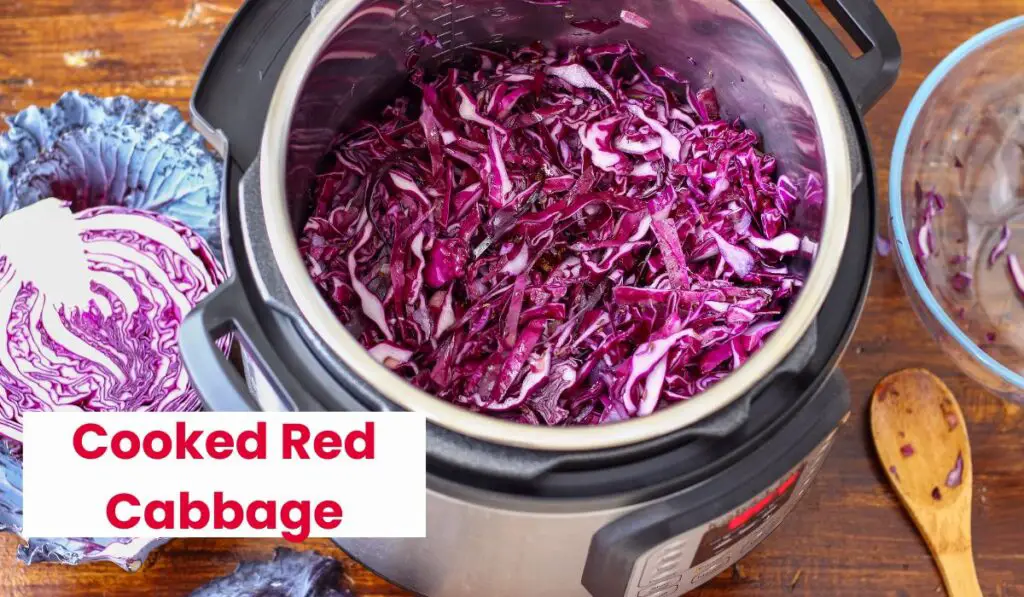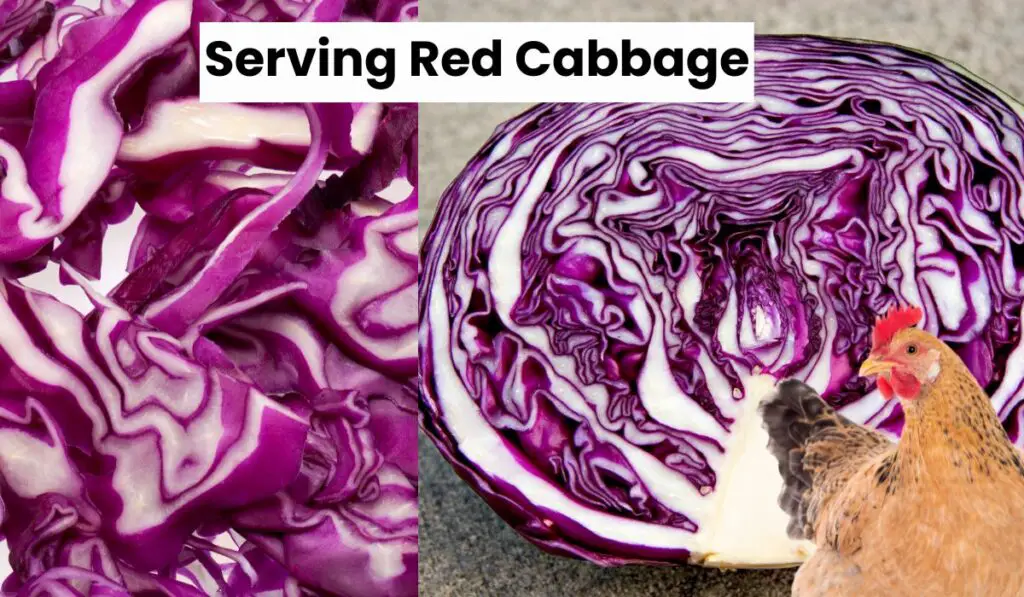
Red cabbage belongs to the Brassicaceae family of vegetables. It’s sometimes referred to as purple cabbage because of the color of its leaves, which resemble purple radishes. This vegetable group also contains other fruits and vegetables that are high in nutrients. People throughout the world utilize it the most frequently. Purple cabbage is healthier and nutrient-rich than its green cabbage mate. Excessive levels of fiber, vitamins, and minerals are present. Red cabbage is a fantastic source of vitamin A because it has ten times as much of it as green cabbage. But if you have chickens in your backyard, you may want to know if they can eat red cabbage.
Yes, hens can quickly eat red cabbage vegetables. It is the actual answer. For your furry friends, this is a nice and safe treat. It will harm the health of your feathered companions if you use it in large quantities. Let’s discuss how often and how much you should serve these vegetables to your poultry pals.
Table of Contents
Is It Okay for Chickens to Eat Red Cabbage?
I know you care deeply about your feathered friends’ well-being as a poultry keepers. Red cabbage is also secure for hens to ingest, like green cabbage. Thanks to the red cabbage, it is entirely risk-free for your feathered friends to devour. The color of your chickens’ droppings turned to a deeper shade after they consumed the red cabbage. Your chickens have finished cabbage if you have seen this symptom.
Before you feed it to your chickens, carefully wash it. You should follow the advice if you buy this vegetable from any supermarket. It is because so many people cultivate this food naturally, using a variety of pesticides or chemicals. So, if your birds are picky, I advise against feeding them unwashed cabbage.
7 Health Benefits of Feeding Red Cabbage to Chickens
Red cabbage contains trace levels of vitamins and minerals, including calcium, manganese, and folate. Compared to green cabbage, it is also ten times more vitamin A rich. Red ball cabbage includes a significant amount of water as well. Let’s examine the health advantages this nutrient-dense purple cabbage veggie offers your feathered buddies.
Bone Health Improvement
Red cabbage, as you are aware, contains a variety of beneficial nutrients. Since hens’ bones are crucial to their overall health, these nutrients are vital. In addition to providing calcium, magnesium, and zinc, this vegetable is a beautiful source of other nutrients that support your backyard hens’ ability to form and maintain healthy bones. Purple cabbage has a good vitamin K level, which helps to keep chickens’ bones healthy. It is also valuable for the treatment of osteoporosis; people who consume vitamin K help to reduce the risk of developing this disease.
Make Strong to the Immune System
Vitamin C, a potent antioxidant, may be abundant in this cabbage. The formation of white blood cells is accelerated by vitamin C, aiding in the defense against dangerous bacteria. This potent antioxidant is also crucial in the fight against free radicals, which weaken the immune systems of your feathery companions and lead to various health issues. Collagen is a protein that helps protect human tissues, and collagen is produced only when vitamin C is present.

Red Cabbage Promotes Digestive Health
Purple cabbage’s rich fiber content helps maintain your fowl companions’ tummies healthy and keeps their food simple to digest. Red ball cabbage’s soluble fiber is advantageous for forming good bacteria in the stomach. Because of the high fiber content, your poultry companions’ digestive systems are clear of obstructions, and constipation is less common. Additionally, it helps your body’s digestive system’s prebiotics and microorganisms in the gut.
Red Cabbage Is Good for the Heart’s Health
This vegetable contains anthocyanins, a healthy substance. Due to its properties, it is a flavonoid antioxidant that contributes to the natural purple color of cabbage. it has a high anthocyanin content, which is excellent for improving the heart health of your flock. Additionally, this substance is said to play a crucial role in lowering blood pressure. Therefore, feeding your backyard chickens Reddish-purple cabbage may protect them from developing cardiovascular illnesses.
Red Cabbage Helps to Reduce Inflammation
Red head cabbage contains the vitamin Sulfur, which is highly efficient in reducing inflammation. In a chicken’s body, inflammation plays a role in various disorders. As a result, cabbage possesses anti-inflammatory properties. It also lessens the discomfort and swelling associated with inflammation in a flock’s body.
Red Cabbage Aids in Preventing Cancer
Sulforaphane and anthocyanins, two substances found in cruciferous cabbage that help prevent many cancer disorders, are also present in this vegetable. In the body of your fussy bird, it eradicates the cancer cells and prevents their growth and spread.
Red Cabbage Has a High-Water Content
A maximum amount of water is present in this cruciferous Red kraut. Water is essential to keep your backyard chickens hydrated on summer days.
2 Ways of Preparing Red Cabbages for Chickens:
There are various methods to cook reddish-purple cabbage for your feathered friends. Below here are a few examples of ways:-
Cooked Red Cabbage

To feed your chickens red cabbage, you can steam or boil it. In the digestive system of your feathered companions, this vegetable turns soft and simple to take after being cooked.
Raw Cabbage
Alternatively, you can also serve raw red cabbage to your picky birds. It will also make an excellent treat for your backyard chickens if you combine some slices of this cruciferous vegetable with other veggies.
How Often Should I Feed Red Cabbage to My Chickens?
You only need sometimes to feed reddish-purple cabbage to your hens. I’ll advise you only to serve this cruciferous vegetable with your chickens twice a week. 10% of the birds’ diet comprises treats, while 90% of their food is pellets. Because of this, it does not give your chickens all the nutrients they require for wellness. Use it as a treat only occasionally as a result.
3 Ways of Feeding Red Cabbage to Chickens:

- Cut the reddish-purple cabbage into pieces and scatter them over the garden so chickens can play with it.
- The five hens in the flock can also be given a whole red ball cabbage, which they will swiftly eat with their beaks.
- By hanging this vegetable with any rope, you may feed your chicken in the best possible way. Your chicken can gladly consume it, and they will also appreciate it.
What Is the Health Risk of Providing Too Much Cabbage to Chickens?
Never think that if your chickens overeat purple cabbage, it will not cause any adverse effect on the health of your chickens. It is your mistake! As discussed in previous articles, everything your chicken consumes in large quantities could harm its health. Like what is happening with purple cabbage, too much amount is unsuitable for backyard chickens. There are many diseases developed from excessive consumption of this vegetable.
- Your chicken’s digestive system is not working correctly due to the large intake of cabbage.
- Your chickens also acquire diseases such as diarrhea, vomiting, and feeling uncomfortable.
- The oxalic acid content is high, which binds calcium and causes calcium deficiency in the body of your flock. It also has a destructive impact on the bone development of chickens.
- The chickens can also reduce egg production.
Summary
Considering this, red head cabbage cabbage is incredibly nutritious for your bird friends. Never serve more than a small amount of this cruciferous vegetable. It’s a beautiful way to provide your feathered friends with essential minerals and health benefits. Keep your chickens busy and healthy by feeding them fresh purple ball cabbage.
FAQs:-
What to do if your chicken can eat a rich amount of red cabbage?
You are concerned about your chicken’s health if it consumes excessive cabbage. When that happens, feeding your bird friend a blended diet like rice and water is best. You can also contact your local veterinarian for pets to get advice on the proper diet for your chicken.
Can baby chicks eat cabbage?
Baby chickens also love to eat everything like chickens. You should serve this purple cabbage to your baby chickens when they get six weeks old, and their stomach is susceptible, so share it by chopping, then it becomes easy to digest.


